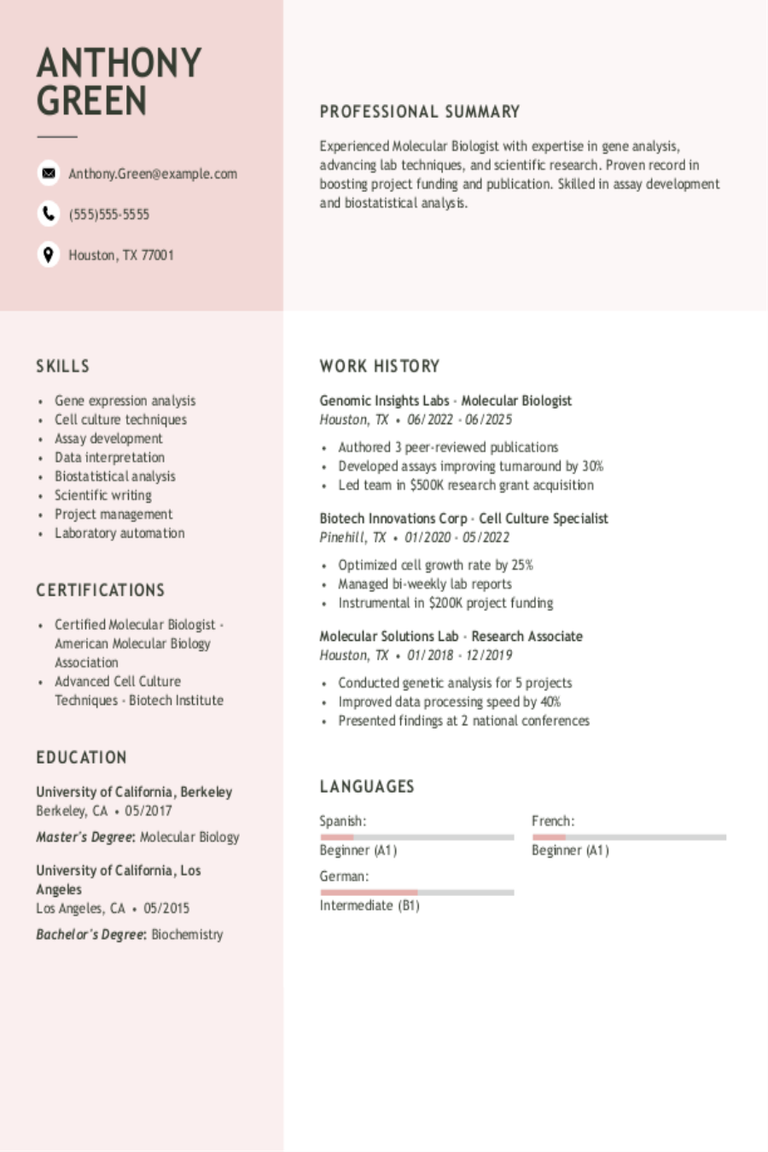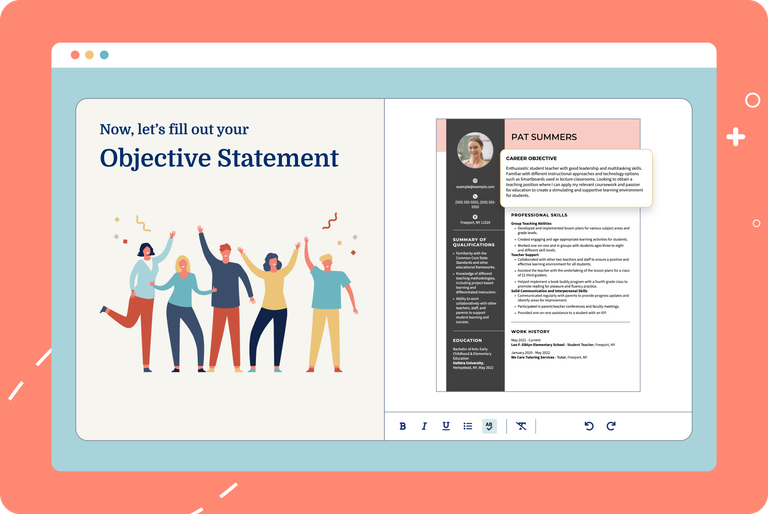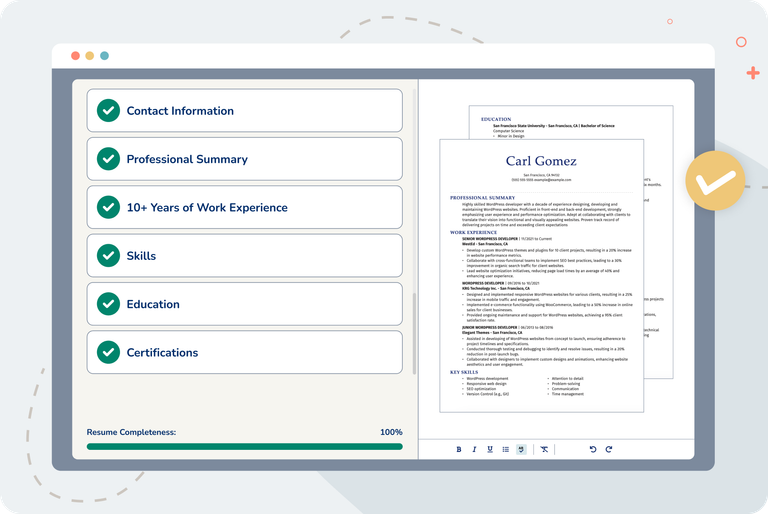Table of Contents
Get started with MyPerfectResume today!
- Build a resume on any device
- Pick an ATS-friendly template
- Tailor with AI copy suggestions
Why this resume works
- Quantifies accomplishments: By citing measurable accomplishments, like discovering 34 new species and securing $500K in funding, the applicant’s resume clearly illustrates their tangible impact.
- Showcases career progression: Starting as an environmental research assistant and advancing to biologist highlights a clear path of career progression and increasing responsibilities over nearly a decade.
- Uses action-oriented language: Strong action verbs such as “led,” “optimized,” and “analyzed” powerfully convey the applicant’s proactive approach and effectiveness in their roles.
More Biologist Resume Examples
Take a look at our biologist resume examples to learn how to highlight your research skills, fieldwork experience, and scientific knowledge. These biology resume samples will help you create a resume tailored to biology careers.
Entry-Level Biologist
Why this resume works
- Centers on academic background: The applicant’s education section presents advanced degrees, illustrating their commitment to academic excellence and laying a strong foundation for their scientific career.
- Effective use of keywords: Incorporating keywords like “biodiversity studies” and “molecular biology” ensures this resume aligns with industry standards, boosting its chances in ATS screenings.
- Puts skills at the forefront: The skills-based resume format places skills such as data analysis and field research at the top, ideal for showcasing early-career expertise.
Mid-Level Biologist
Why this resume works
- Points to measurable outcomes: By securing $120,000 in research grants, the applicant clearly shows their ability to achieve measurable outcomes and drive conservation success.
- Displays technical expertise: The applicant showcases technical expertise through certifications like GIS Professional Certification, improving their capability in spatial analysis and ecological data management.
- Demonstrates language abilities: Language skills in Spanish, French, and Mandarin aid cross-cultural communication, important for international environmental projects.
Experienced Biologist
Why this resume works
- Showcases impressive accomplishments: Illustrating standout achievements like publishing an award-winning paper and reducing analysis time by 40% reflects a strong impact in ecological research.
- Emphasizes leadership skills: Leading a team of five in biodiversity assessments highlights the applicant’s leadership skills and ability to manage and inspire others effectively.
- Lists relevant certifications: Certifications such as Certified Ecologist show the biologist’s expertise and ongoing commitment to professional growth.
Biologist Resume Template (Text Version)
Cameron Henderson
St. Louis, MO 63102
(555)555-5555
Cameron.Henderson@example.com
Professional Summary
Accomplished biologist with 9 years in field ecology. Proven leader in biodiversity research and sustainable practices. Skilled in data analysis and ecosystem management for impactful environmental solutions.
Skills
- Biodiversity Assessment
- Environmental Impact Analysis
- Wildlife Conservation
- Geographical Information Systems
- Data Collection & Analysis
- Scientific Writing
- Field Research Techniques
- Project Management
Certifications
- Certified Ecologist – Ecological Society of America
- Wildlife Biology Certification – Wildlife Society
Education
Master’s Degree Biology
State University Springfield, Illinois
May 2016
Bachelor’s Degree Environmental Science
City College Springfield, Illinois
May 2014
Work History
Biologist
BioTech Solutions – St. Louis, MO
April 2023 – June 2025
- Led surveys that identified 34 new species.
- Optimized lab processes saving 18% time.
- Published quarterly reports enhancing knowledge.
Field Scientist
GreenEarth Studies – St. Louis, MO
March 2019 – March 2023
- Analyzed soil samples boosting 25% yield.
- Conducted research projects with 12 sponsors.
- Wrote grants securing 0K in funding.
Environmental Research Assistant
Nature Alliance Institute – Parkview, MO
June 2016 – February 2019
- Monitored wildlife population trends yearly.
- Streamlined data entry, reducing errors 15%.
- Assessed ecosystem health with 92% accuracy.
Languages
- Spanish – Beginner (A1)
- French – Intermediate (B1)
- German – Beginner (A1)
Related Resume Guides
Advice for Writing Your Biologist Resume
Explore our tips on how to write a resume for a biologist position and discover how to highlight your scientific expertise, research experiences, and passion for biology. Whether you’re just starting or looking to advance in your career, these tailored insights will help you craft a standout resume that showcases your unique skills and contributions to the field.
Highlight relevant certifications and training
For a biologist, getting the right certifications and training can lead to more opportunities in academia and research. Certifications highlight that you’ve gained specific skills needed for certain tasks, helping employers see your readiness. Specialized training is key as it keeps you updated with the latest tools and methods. Here are a few examples:
- Certified Biological Safety Professional (CBSP)
- Registered Biological Technician (RBTech)
- Associate Wildlife Biologist (AWB)
- Certified Ecologist (ESA)
- Certified Clinical Research Professional (CCRP)
These certifications help you succeed by proving you are equipped with the right tools and knowledge. Including a certifications and training section on your resume after education or skills makes it easy for employers to find. This section shows your commitment to learning and staying current in biology. See an example below.
Example of a certifications & training section
Certified Wildlife Biologist
Issued by: The Wildlife Society
Issued 2021
Genomic Data Analysis
Issued by: Coursera, offered by Johns Hopkins University
Completed 2023
Advanced Biological Laboratory Safety Training
Issued by: Occupational Safety and Health Administration (OSHA)
Expires 2024
Ecological Field Methods Workshop
Issued by: Ecological Society of America (ESA)
Completed 2020
Marine Biology Diving Certification
Issued by: Professional Association of Diving Instructors (PADI)
Issued 2019
Get ideas for your resume by checking out our professional resume examples. They’re a great way to see what works and make your own stand out.
List your most relevant skills
For a biologist, having a well-rounded set of skills is essential. Technical skills like lab techniques, data analysis, and software tools should be highlighted in your resume. It’s also important to show soft skills such as communication, problem-solving, and teamwork. These help you work well with others and share your findings. Including both types of skills gives a full picture of what you can do.
Create a dedicated skills section on your resume to specific software you know how to use, like Excel or specialized biology programs. If you have artistic abilities that aid in visual presentations or illustrations, mention those too.
To make your skills stand out even more, weave them into the descriptions of your past jobs or projects. For example, say how you used a particular technique to achieve a result or solved a problem using teamwork. By tying skills directly to accomplishments, potential employers can better understand how you’ll contribute to their team as a biologist.
Highlight your research and analytical skills by selecting a resume format that organizes your achievements clearly and professionally.
Write a strong professional summary
A professional summary on a resume offers hiring managers a quick view of your skills and experience. When crafting your resume, you can choose between a summary and a resume objective to start strong. The choice depends on your level of experience and career goals.
A professional summary is a three to four sentence snapshot showing what you’ve done in your career, highlighting key skills and achievements. It’s best for experienced applicants who want to quickly show their professional identity and the value they bring to the table. This section tells employers “what I’ve accomplished” and why you’re the right fit for the job.
On the other hand, resume objectives are statements about what you aim to achieve in your career. They’re ideal for entry-level workers, those changing careers, or individuals with employment gaps.
We’ll provide examples of both summaries and objectives tailored for different industries and levels of experience.
Biologist resume summary examples
Entry-level
Recent Bachelor of Science in Biology graduate with a focus on cellular and molecular biology. Skilled in laboratory techniques such as PCR, gel electrophoresis, and microscopy. Completed an internship in a research lab where foundational skills in data collection and analysis were developed. Eager to contribute to biological research and innovation.
Mid-career
Biologist with over five years of experience in environmental studies and wildlife conservation projects. Experienced in conducting field surveys, analyzing ecological data, and preparing scientific reports. Known for collaboration with cross-functional teams to achieve project goals. Holds certifications in GIS mapping and habitat assessment.
Experienced
Senior biologist specializing in marine ecosystems with more than 15 years of impactful research work. Expert in leading large-scale biodiversity projects and managing multidisciplinary teams. Published author of several peer-reviewed papers focusing on climate change effects on marine life. Committed to advancing scientific knowledge and influencing policy changes for sustainable practices.
Biologist resume objective examples
Recent graduate
Passionate and detail-oriented recent biology graduate seeking an entry-level biologist position to apply academic knowledge and laboratory skills in a research or environmental setting. Committed to contributing to scientific advancements and environmental sustainability through dedicated research efforts.
Career changer
Enthusiastic professional transitioning into a biologist role, bringing a strong background in data analysis and project management from experience in the tech industry. Eager to leverage analytical skills and a passion for biological sciences to contribute to innovative research projects and environmental conservation initiatives.
Specialized training
Recent biology graduate with specialized training in molecular biology techniques seeking an opportunity as an entry-level biologist. Excited about contributing to groundbreaking research in genetics or biomedical fields by using hands-on laboratory experience and strong problem-solving abilities.
Show off your biology skills! Use our AI Resume Builder to organize your research and lab experience neatly, making sure you stand out.
Showcase your accomplishments and publications
Including a publications and presentations section on your resume as a biologist can highlight your research achievements and showcase your academic contributions. Listing peer-reviewed articles, book chapters, and conference papers demonstrates your expertise in the field and gives potential employers insight into the depth of your knowledge.
Use a structured format to provide citation details for your publications, such as journal name, volume, issue, and year, by following professional style guides like APA or Chicago. This ensures clarity while establishing credibility.
In addition to publications, include noteworthy awards, grants, or fellowships that reflect recognition for your research efforts. These accomplishments show that your work has been acknowledged and supported by reputable institutions or organizations.
For added visibility, link to online research profiles like Google Scholar, ResearchGate, or ORCID, where employers can explore more details about your work. Providing access to these profiles makes it easier for hiring managers to review the impact of your research.
Tailoring this section specifically for biology roles helps emphasize relevant expertise in areas like ecology, molecular biology, or conservation science. Thoughtfully organized content in this subsection not only adds weight to your qualifications but also highlights how you’ve contributed meaningfully to scientific advancements.
Example of publications section
Publications
- Martinez, L., & Chen, H. (2023). Genetic adaptation in coastal plant populations under climate stress. Journal of Experimental Biology, 226(4), 452–460.
- Martinez, L. (2022). Assessing biodiversity in restored wetlands using eDNA metabarcoding. Ecological Applications, 32(7), e2556.
- Chen, H., Martinez, L., et al. (2021). Novel CRISPR-Cas9 applications in marine microbiology. Nature Biotechnology, 39(9), 1132–1139.
Choose a straightforward, tidy resume template with clear headings and readable fonts. Avoid elaborate designs or fancy fonts to ensure your skills and experience stand out to employers.
Salary Insights for Biologists
Learning about salary data can help you make informed decisions about your career path or relocating to a new area. Explore trends across biology roles and find more details below.
Top 10 highest-paying states for biologists
Biologists earn varying salaries across the United States, with a national average of $79,044. The table below highlights the states where biologists command the highest compensation.
Our salary information comes from the U.S. Bureau of Labor Statistics’ Occupational Employment and Wage Statistics survey. This official government data provides the most comprehensive and reliable salary information for writers across all 50 states and the District of Columbia. The figures presented here reflect the May 2025 dataset, which is the most recent available as of this publication.
| State | Average Salary |
|---|---|
| Massachusetts | $98,390 |
| Rhode Island | $97,070 |
| Maryland | $95,790 |
| New York | $94,660 |
| Mississippi | $94,330 |
| California | $91,460 |
| Washington | $90,370 |
| Louisiana | $87,260 |
| New Jersey | $86,480 |
| Alaska | $86,060 |
FAQ
Do I need to include a cover letter with my biologist resume?
Yes, adding a cover letter to your biologist resume can boost your application and increase your chances of securing an interview. A cover letter lets you share why you’re passionate about biology and how your skills match the research or projects at the company or institution.
For example, if they focus on conservation efforts or boast cutting-edge lab facilities, you can emphasize your relevant experience in those areas. Consider using tools like our Cover Letter Generator to craft a personalized cover letter that complements your resume while offering expert content suggestions.
Additionally, reviewing cover letter examples from our library can inspire and ensure yours is tailored effectively to various roles within the biological sciences field.
How long should a biologist’s resume be?
For a biologist, a one-page resume is usually enough to showcase essential skills like lab techniques, research experience, and relevant coursework.
If you have extensive experience or multiple publications, a two-page resume might be right for you.
Ensure every detail on your resume is relevant to the role you’re targeting. Highlight recent experiences that show your expertise in biology and related fields, including any specialized certifications or major projects.
Check out our guide on how long a resume should be for more examples and tips on choosing the ideal length for your career stage.
How do you write a biologist resume with no experience?
Crafting a biologist resume when you have no experience can be tough, but focusing on your education, skills, and any projects can help make a strong impression. Here are a few tips on how to write a resume with no experience:
- Emphasize education: Start with your degree in biology or a related field. Include the name of the institution, graduation date, and any academic honors or awards. Mention relevant coursework like genetics, ecology, or microbiology.
- Include lab work and projects: List any laboratory courses or independent research projects where you gained hands-on experience. Describe what you did in these labs—like using specific equipment or techniques—and any outcomes or findings.
- Highlight transferable skills: Focus on skills such as data analysis, problem-solving, attention to detail, and teamwork. If you’ve developed these through group projects or internships, be sure to mention them.
Consider including volunteer experiences or extracurricular activities related to biology that demonstrate initiative and passion for the field.
Rate this article
Biologist
Share this page
Additional Resources

Microbiologist Resume Examples & Templates
Explore microbiologist resume examples to learn how to highlight your lab skills, like using microscopes and doing experiments.Build my resumeImport existing resumeCustomize this templateWhy this resume worksQuantifies accomplishments: By showcasing

Molecular Biologist Resume Examples & Templates
Explore molecular biologist resume examples and tips to learn how to showcase lab skills, research projects, and scientific techniques. Use these samples to highlight your attention to detail and problem-solving

The Illusion of Wage Growth: Where Paychecks Stretch the Farthest
U.S. wages have climbed at one of the fastest rates in modern history. Between 2020 and 2024, the average American worker’s pay rose from about $64,000 to $75,600, an 18%

100+ Resume Objective Statement Examples & Best Practices
In just a sentence or two, a resume objective statement tells hiring managers the role or career path you’re aiming for and the unique skills and value you bring to

150+ Skills for a Resume: Examples for Any Job
Crafting a standout resume starts with highlighting the skills and qualifications that demonstrate your fit for the role. But in a crowded job market, knowing which abilities will actually catch

When to Use a Two Page Resume (With Examples & Formatting Tips)
If you’ve spent years building your skills, growing in your career, and racking up accomplishments, a one-page resume might not cut it. A two-page resume gives you space to present a
